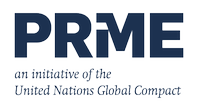Sustainable development
In 1999, Mälardalen University, as the first university in the world, was environmentally certified according to the international ISO14001 standard. Since then Mälardalen University's commitment to sustanability continues to grow. In 2019, Mälardalen University signed the Climate Framework along with 35 other Swedish universities.

PRME – Principles for Responsible Management Education
The School of Business, Society and Engineering at Mälardalen University is a member of Principles for Responsible Management Education (PRME), which is the largest organised link between the United Nations (UN) and business schools. The mission of PRME is to transform management education, research and thought leadership globally by providing the Principles for Responsible Management Education with a framework, by developing learning communities and by promoting awareness about the United Nations' Sustainable Development Goals.
Prme Report 2017-2018 Pdf, 6.6 MB.
Pdf, 6.6 MB.
Prme Report 2019-2021 Pdf, 7.9 MB.
Pdf, 7.9 MB.
Prme Report 2021-2023 Pdf, 7.8 MB.
Pdf, 7.8 MB.
Achievements education
- In 1999, Mälardalen University, as the first university in the world, was environmentally certified according to the international ISO14001 standard.
- Mälardalen University was the first higher education institution in Sweden to be certified for its work environment.
- ERS (Ethics, Responsibility and Sustainability) are woven into the current courses via lectures, case seminars and written exams.
- We invited all English-speaking business students to a series of business ethics lectures with an acknowledged researcher of ERS issues.
- Mälardalen University has further focus on integrated elements of sustainable development and ethics in the business programmes.
Future goals education
Mälardalen University will:
- continue ensuring that all Swedish and English-speaking business programmes have ERS issues integrated into their course curriculums.
- continue to annually host events and invite business students to a business ethics day with acknowledged speakers regarding ERS.
- strengthen the teaching competence base for the business programmes within the area of ethics, responsibility and sustainability by taking these aspects into account when recruiting new faculty members.
Achievements research
The School of Business, Society and Engineering at Mälardalen University has achieved the following when it comes to academic research and knowledge development with companies in the field of corporate responsibility and sustainability:
- positional analysis for sustainable development where alternatives to neoclassical cost-benefit analysis, CBA, are suggested
- Smart Cities, whose goal is to aspire to develop innovative solutions and tools for energy-smart cities, improving energy consumption
- how the ”sustainable city” is shaped over time
- sustainable society, for example the Labour Market of the Future
- the potential conflict between economic growth and the environment
- the socio-economic and socio-cultural context and its relevance related to social responsibility
- developing indicators to be utilised by real-estate management to enhance issues of sustainability in the dialogue between stakeholders
- further focus on integrated elements of sustainable development and ethics in the business programmes.
Future goals research
Mälardalen University will:
- continue relating their research to issues of ethics, responsibilities and sustainability in their involvement and cooperation with companies and municipalities
- implement ERS even further in our ongoing effort to link together international academic research, business practice and society in promoting sustainable enterprises and communities
- strengthen the research competence base within the area of ethics, responsibility and sustainability by taking these aspects into account when recruiting new faculty members.
For more information, please contact Eva Maaninen-Olsson.
The Climate Framework
In 2019, 36 Swedish universities and colleges created a combined climate framework to serve as the basis for individual climate strategies. This Climate Framework has been produced on the initiative of Higher Education Institutions (HEIs) with the ambition of clearly contributing to climate change adaptation in line with society’s national and international commitments. By 2030, all the HEI signatories of this Climate Framework will have implemented measures in order to be in line with the Paris Agreement's 1.5°C target.
By signing the Climate Framwork, Mälardalen University undertakes to do the following:
- through education, research and external engagement help society as a whole to achieve set targets
- work to reduce Mälardalen University's own climate impact in line with society’s commitment as expressed in national and international agreements
- based on Mälardalen University's HEI-specific conditions, set up far-reaching targets for
climate-related work and also allocate resources to achieve these targets and conduct follow ups - clearly communicate Mälardalen University's climate-related work in order to inspire andspread knowledge to other organisations and members of society.
